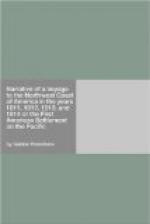him by repeated blows on the head with it. The
other savages, seeing the bulk of our people approaching
the scene of combat, retired and crossed the river.
In the meantime, Mr. Stuart extracted the arrows from
his body, by the aid of one of the men: the blood
flowed in abundance from the wounds, and he saw that
it would be impossible for him to pursue his journey;
he therefore gave orders for the canoes and goods
to be carried back to the lower end of the portage.
Presently they saw a great number of pirogues full
of warriors coming from the opposite side of the river.
Our people then considered that they could do nothing
better than to get away as fast as possible; they
contrived to transport over one canoe, on which they
all embarked, abandoning the other and the goods,
to the natives. While the barbarians were plundering
these effects, more precious in their estimation than
the apples of gold in the garden of the Hesperides,
our party retired and got out of sight. The retreat
was, notwithstanding, so precipitate, that they left
behind an Indian from the Lake of the Two Mountains,
who was in the service of the Company as a hunter.
This Indian had persisted in concealing himself behind
the rocks, meaning, he said, to kill some of those
thieves, and did not return in time for the embarkation.
Mr. Keith regretted this brave man’s obstinacy,
fearing, with good reason, that he would be discovered
and murdered by the natives. We rowed all that
day and night, and reached the factory on the 9th,
at sunrise. Our first care, after having announced
the misfortune of our people, was to dress the wounds
of Mr. Stuart, which had been merely bound with a
wretched piece of cotton cloth.
The goods which had been abandoned, were of consequence
to the Company, inasmuch as they could not be replaced.
It was dangerous, besides, to leave the natives in
possession of some fifty guns and a considerable quantity
of ammunition, which they might use against us.[S]
The partners, therefore, decided to fit out an expedition
immediately to chastise the robbers, or at least to
endeavor to recover the goods. I went, by their
order, to find the principal chiefs of the neighboring
tribes, to explain to them what had taken place, and
invite them to join us, to which they willingly consented.
Then, having got ready six canoes, we re-embarked
on the 10th, to the number of sixty-two men, all armed
from head to foot, and provided with a small brass
field-piece.
[Footnote S: However, some cases of guns and
kegs of powder were thrown into the falls, before
the party retreated.]
We soon reached the lower end of the first rapid:
but the essential thing was wanting to our little
force; it was without provisions; our first care then
was to try to procure these. Having arrived opposite
a village, we perceived on the bank about thirty armed
savages, who seemed to await us firmly. As it
was not our policy to seem bent on hostilities, we
landed on the opposite bank, and I crossed the river




